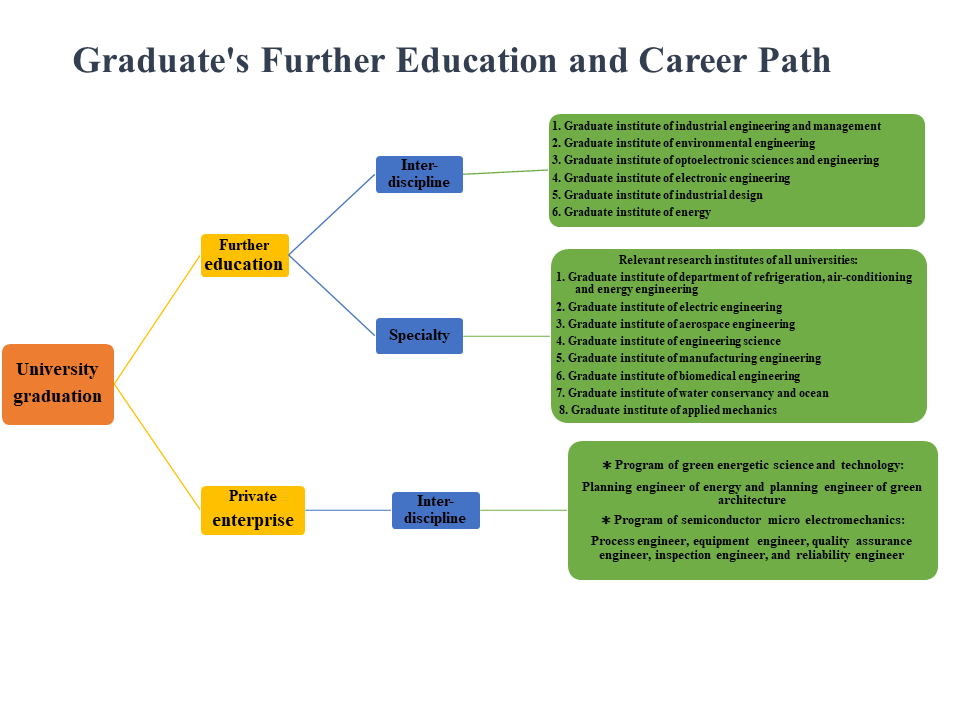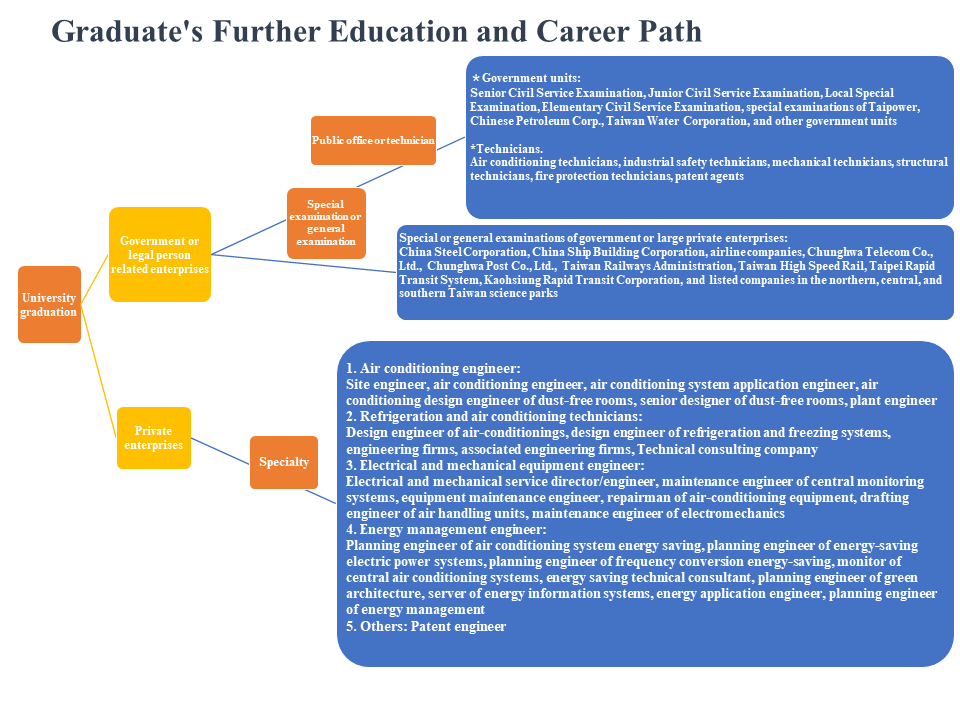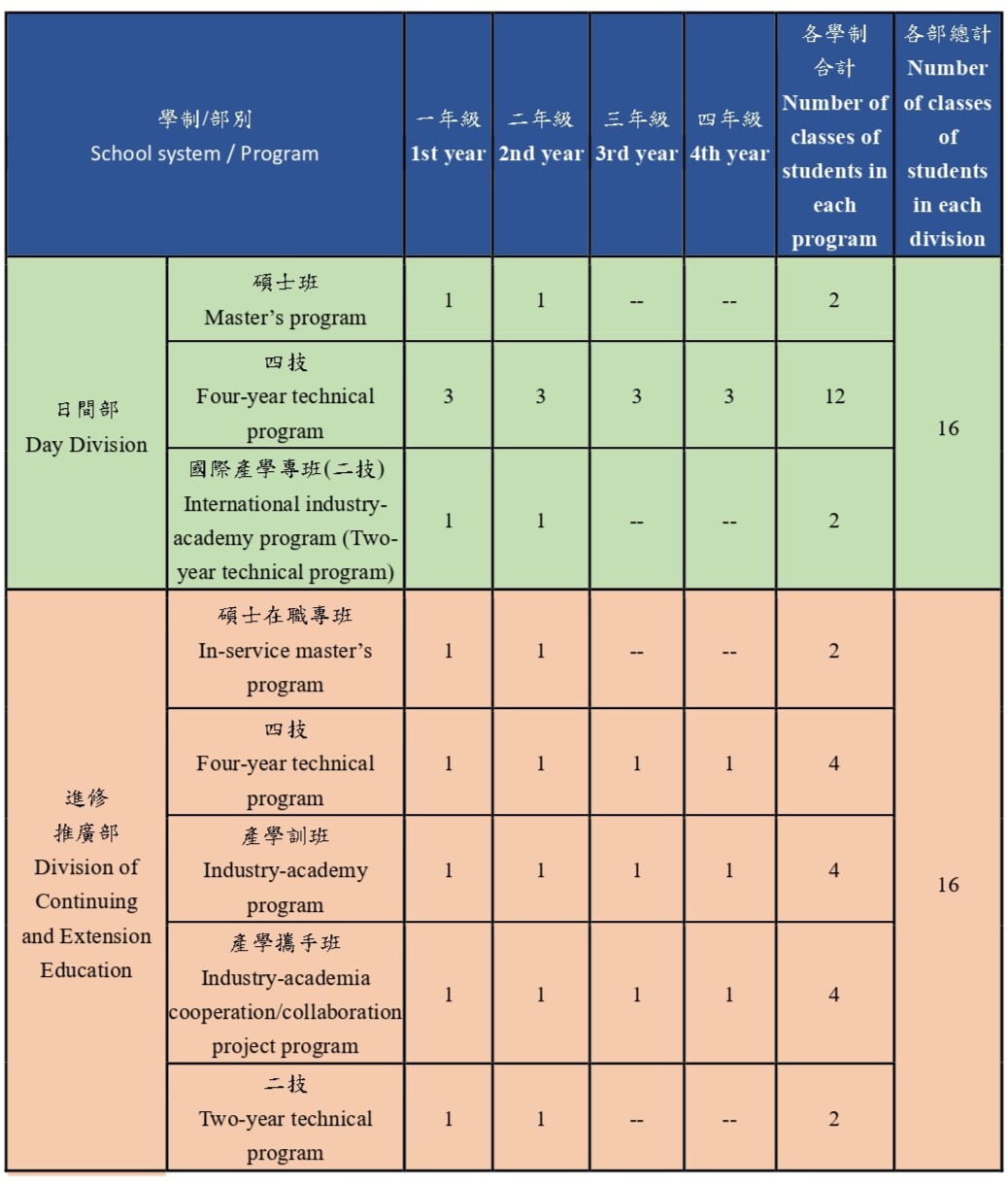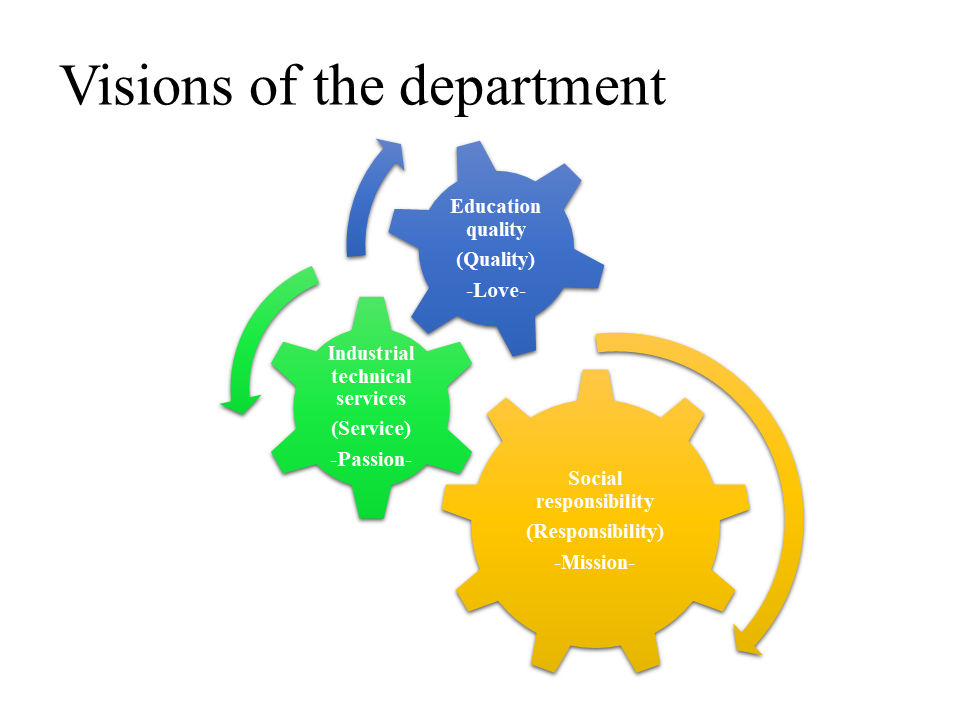
In these years, Taiwan’s economy is developing prosperously and people are therefore pursuing a better quality of life. However, Taiwan is in a subtropical region. It is humid and hot in summer. Refrigeration equipment and air-conditioning systems are necessaries to provide comfortable workplaces in office buildings, medical buildings, department stores, vehicles, supermarkets, and particularly households. With the enhancement of various industrial technologies in Taiwan, the requirements of temperature, humidity and cleanliness for industrial processes are becoming stricter. High-tech semiconductors and various precision industries especially require high-level refrigeration and air-conditioning technologies. As the result, the output value from the refrigeration and air-conditioning industry expands continuously. In addition, excessive carbon dioxide emissions from the petrochemical industry exacerbate global warming and air pollution, so energy saving and carbon reduction and the development and application of new energy has been emphasized in these years in the world. Therefore, it is important to cultivate the technicians specializing in energy-saving technology, energy management and energy application and develop relevant technologies. In light of this, NCUT has established Department of Refrigeration, Air Conditioning and Energy Engineering to cultivate relevant professional technical personnel and technicians for refrigeration and air conditioning, environmental control and energy application.
The technology R&D focused by the Department includes the R&D and testing of refrigeration, air-conditioning and energy-saving equipment (including industrial or bioenvironmental control technology, frequency converting and energy efficiency technology) and integration of renewable energy and air-conditioning system technology (including solar thermal energy, hydrogen energy and fuel cells, heat pump dehumidification system, and energy efficiency for residence and office buildings).
With its educational objectives based on enhancement of students’ practical skills, the Department adopts the educational objectives of NCUT (to cultivate quality talents that have “professional knowledge, humanistic literacy, social care and international perspectives”) and the development philosophy of the College (innovation, pragmatism and cooperation) to be core values, to cultivate talents with theory and practice in the engineering field, have students have abilities to think and communicate independently, enrich teachers’ and students’ abilities for practical technologies and innovative research and development, promote the integration of cross-disciplinary knowledge, develop students’ professional knowledge, humanistic literacy, social care and point of view, and plan for the educational objectives and development characteristics of the Department. The Department also establishes core abilities and graduation conditions for students, the student recruitment policies and the regulations for appointment of professional teachers. By establishing a sound administrative management mechanism, planning and utilizing the space and resources of the Department well, developing in line with the trends of the development of refrigeration, air conditioning and energy application industries, and grasping the pulse of the world, the Department is expressing its development characteristics and enhancing students’ competitiveness.
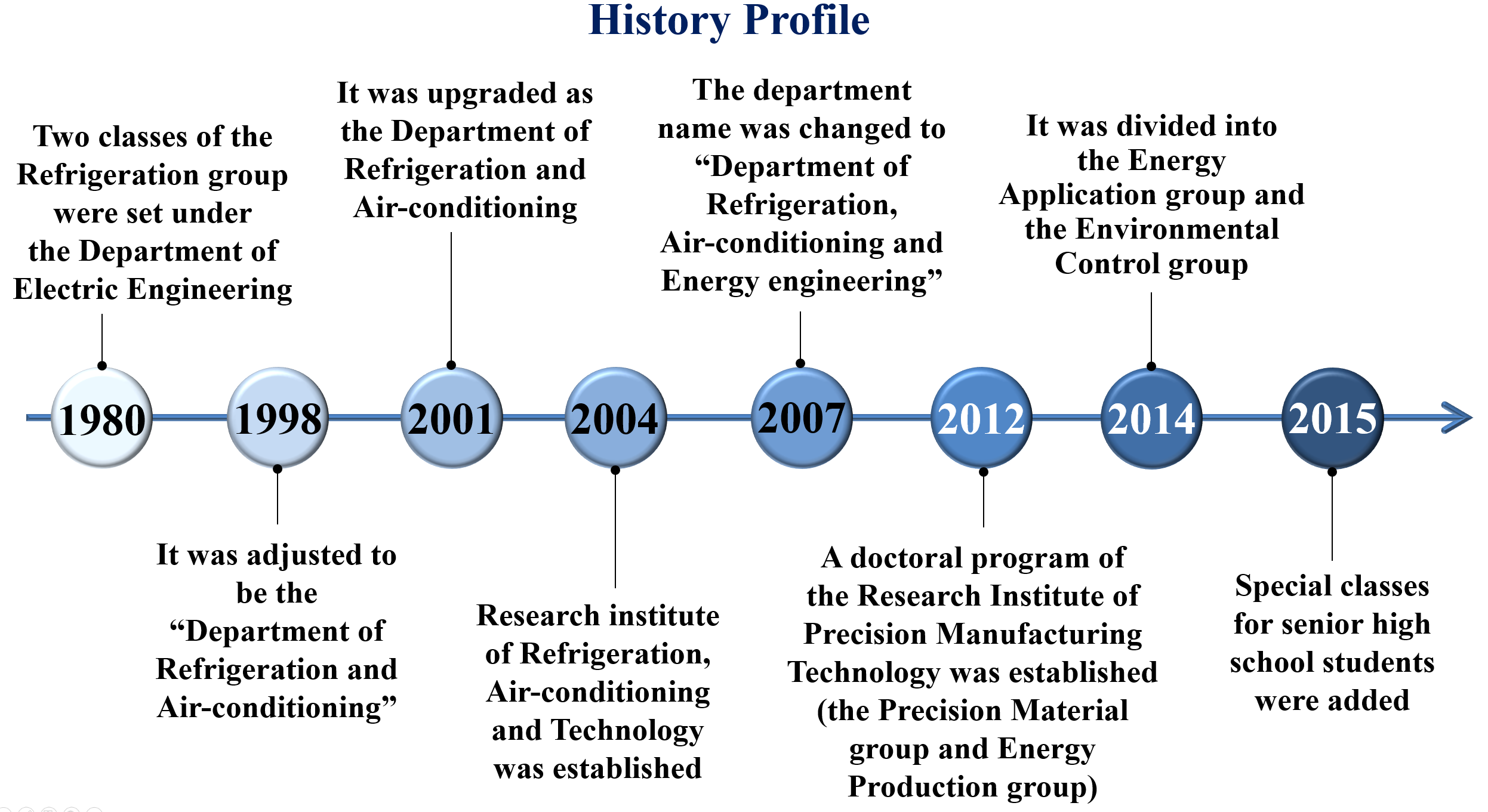
In these years, Taiwan’s economy is developing prosperously and people are therefore pursuing a better quality of life. However, Taiwan is in a subtropical region. It is humid and hot in summer. Refrigeration equipment and air-conditioning systems are necessaries to provide comfortable workplaces in office buildings, medical buildings, department stores, vehicles, supermarkets, and particularly households. With the enhancement of various industrial technologies in Taiwan, the requirements of temperature, humidity and cleanliness for industrial processes are becoming stricter. High-tech semiconductors and various precision industries especially require high-level refrigeration and air-conditioning technologies. As the result, the output value from the refrigeration and air-conditioning industry expands continuously. In addition, excessive carbon dioxide emissions from the petrochemical industry exacerbate global warming and air pollution, so energy saving and carbon reduction and the development and application of new energy has been emphasized in these years in the world. Therefore, it is important to cultivate the technicians specializing in energy-saving technology, energy management and energy application and develop relevant technologies. In light of this, NCUT has established Department of Refrigeration, Air Conditioning and Energy Engineering to cultivate relevant professional technical personnel and technicians for refrigeration and air conditioning, environmental control and energy application.
There are only three technology universities that have established a department or graduate institute relevant to refrigeration and air conditioning, Two of them are national universities: National Taipei University of Technology and National Chin-Yi University of Technology. The other one, Tungnan University, is a private university. Ordinary universities do not have a department relevant to the field. National Taipei University of Technology is located in Taipei City, and Tungnan University is located in New Taipei City. NCUT, located in Taichung City, is the only university that has a department relevant to refrigeration and air conditioning in southern Taiwan. The importance of NCUT is noticeable. To fit the needs of the era and the industry, the Department has also included energy as a theme for its courses and developed energy application technologies covering energy efficiency and new energy, so as to cultivate students to become technical talents for integration of refrigeration, air conditioning and energy application after being graduated from the Department. The Department cultivates students mainly based on three themes. In the first theme, it cultivates students to become the talents that have abilities for the design, planning and R&D of refrigeration, air-conditioning and energy efficiency. In the second, it cultivates students to become the talents that have abilities for engineering, supervision, repair and maintenance with respect to refrigeration, air conditioning and energy efficiency. In the third, it cultivates students to become the talents that have abilities for design, engineering, maintenance and management with respect to factories, and the talents that have abilities for the fourth dimension new energy, energy efficiency and energy application. Students may choose to work as refrigeration and air conditioning technicians or work in refrigeration and air conditioning firms, refrigeration and air conditioning engineering companies, refrigeration and air conditioning equipment manufacturers, refrigeration and air conditioning products marketing, selling and maintenance companies or new energy development and energy efficiency or energy management companies, or apply for relevant jobs in public enterprises,government agencies, etc. They will have many job choices after graduation. The talents cultivated by the Department are very important for the country as well as the society. Taiwan Refrigeration and Air-conditioning Engineering Association of R.O.C. has more than 1,000 corporate members; however, professional technicians cultivated by domestic colleges and universities every year are only 300 persons, including bachelors and masters, among whom around 180 persons are graduated from the master’s program provided by the Department. The importance and influence of the Department in terms of cultivation and provision of professional talents in the field is perceptible.
With its educational objectives based on enhancement of students’ practical skills, the Department adopts the educational objectives of NCUT (to cultivate quality talents that have “professional knowledge, humanistic literacy, social care and international perspectives”) and the development philosophy of the College (innovation, pragmatism and cooperation) to be core values, to cultivate talents with theory and practice in the engineering field, have students have abilities to think and communicate independently, enrich teachers’ and students’ abilities for practical technologies and innovative research and development, promote the integration of cross-disciplinary knowledge, develop students’ professional knowledge, humanistic literacy, social care and point of view, and plan for the educational objectives and development characteristics of the Department. The Department also establishes core abilities and graduation conditions for students, the student recruitment policies and the regulations for appointment of professional teachers. By establishing a sound administrative management mechanism, planning and utilizing the space and resources of the Department well, developing in line with the trends of the development of refrigeration, air conditioning and energy application industries, and grasping the pulse of the world, the Department is expressing its development characteristics and enhancing students’ competitiveness.
I. Education objectives for undergraduates
1. Have students become professional talents with theoretical and practical capabilities for refrigeration, air conditioning and energy.
(1) Have students acquire relevant knowledge and skills in mathematics, science, refrigeration and air conditioning, energy, and electromechanical control to enable them to solve basic problems concerning refrigeration and air conditioning and energy engineering.
(2) Cultivate students to have abilities to plan, design and supervise refrigeration, air conditioning and energy systems.
(3) Improve students' ability of expressing their opinions.
2. Develop abilities for consistent growth and learning.
(1) Train students to develop abilities for consistent self-growth and learning.
(2) Have students understand the trends and influence of industrial development.
3.Emphasize development of humanities and the responsible attitude.
(1) Emphasize development of teamwork spirit.
(2) Cultivate students to become professional talents with humanistic literacy, engineering ethics, social care and international perspectives.
II. Educational objectives for students in the graduate institute
1.Have students become professional talents with theory and practice (professional ability) who have abilities for independent thinking and innovative R&D with respect to refrigeration, air conditioning and energy.
2.Develop abilities for consistent growth, communication, coordination and teamwork (self-growth).
3.Cultivate students to become professional talents with international perspectives. (Develop international outlook.)
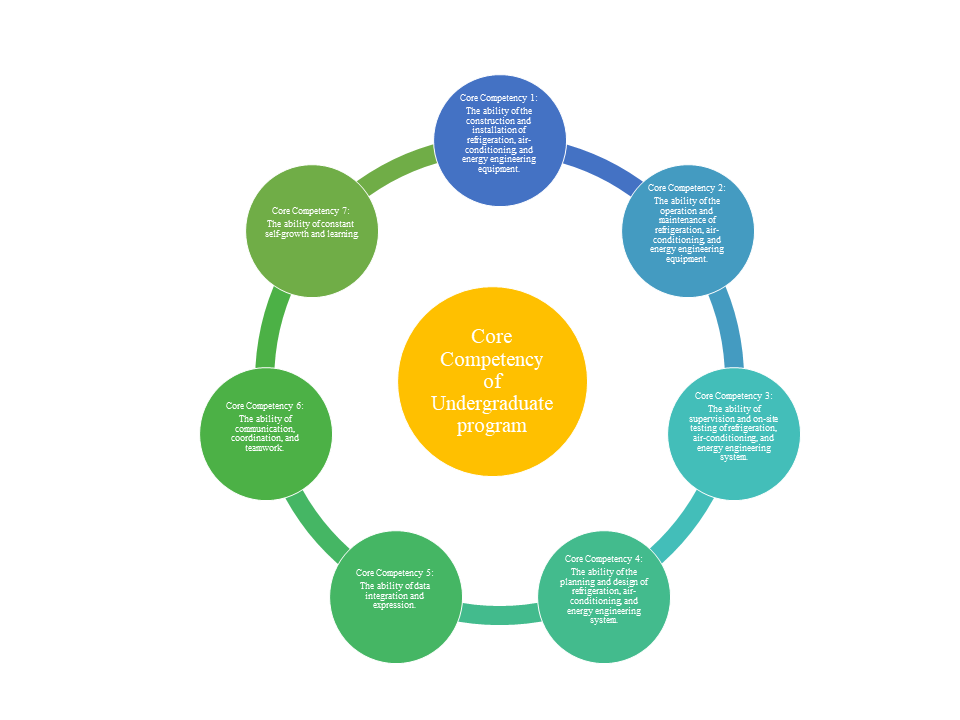
1.The technology R&D focused by the Department includes the R&D and testing of refrigeration, air-conditioning and energy-saving equipment (including industrial or bioenvironmental control technology, frequency converting and energy efficiency technology) and integration of renewable energy and air-conditioning system technology (including solar thermal energy, hydrogen energy and fuel cells, heat pump dehumidification system, and energy efficiency for residence and office buildings)
2.Key development features of teaching:
2.1 Undergraduates:
- The Department’s curriculum is divided into three areas: “Refrigeration and air-conditioning technology”, “mechatronics technology”, and “energy application technology”. The courses designed fit the needs of these industries, future trends, knowledge development and technological progress.
- Department-based courses are designed to have students be qualified to be refrigeration and air-conditioning engineers, refrigeration and air-conditioning technicians, electromechanical equipment engineers and energy management engineers.
- Teachers are encouraged to make their own digital and audio-visual teaching materials.
- The Department, which pays attention to development of students’ practical techniques, has established the “Refrigeration and Air-conditioning Installation and Repair Level B” test site equipped with relevant equipment for Electrical Equipment Inspection training site.
- The Department works with the Industrial R&D Center of Ho Tai Development Co., Ltd. to provide Variable Frequency Air-Conditioning Practice (1), Variable Frequency Air-Conditioning Practice (2), Variable Frequency Air-Conditioning Practice (3), and Variable Frequency Air-Conditioning Practices (4).
- The Department provides students with learning and employment assistance and understands employment of its graduates through the Alumni Association.
- The Department, which emphasizes students' practical experience accumulated, arranges for off-campus internships in winter and summer vacations and encourages students to participate in the internships provided by its partner establishments.
- The Department provides counseling for students to acquire professional licenses and certificates, and include acquisition of licenses or certificates into the graduation requirements.
- The Department invites experts from the industry to co-teach at the Department.
2.2 Master’s program
- As for the curriculum for general students in the master’s program, “Seminar” is a required course provided for students in their 1st and 2nd years, and “Refrigeration and Air Conditioning System Engineering”, “Advanced Thermodynamics”, “Advanced Heat Transfer”, and “Advanced Fluid Mechanics” are core elective courses. Students are required to take at least 2 of these 4 elective courses to develop their professional knowledge.
- For enhancement of students' practical ability in the workplace, external scholars and experts are invited to give speeches for students in the master’s program and the in-service master’s program.
- To expand international perspectives of graduate students, the Department provides the scholarship for students to participate in international conferences.
- Students participate in the industry-academy research projects to improve their research level and facilitate close connection between professional technical talents and the industry.
- Each student in the master’s program shall publish at least one thesis at a seminar or in a journal.
3.Emphases of industrial services and R&D development characteristics:
3.1 Conduct the R&D projects funded by government agencies (Ministry of Science and Technology, Ministry of Economic Affairs, Ministry of Education, etc.) and cooperate with the industry actively to provide technical counseling for the issues encountered by the regional industry and carry out industry-academy cooperation activities, including the development of energy efficient components, the evaluation of energy-saving systems and energy-saving effects, the analysis of efficiency improvement, the efficiency of cleanroom or negative pressure isolation ward, the analysis of flow field, the analysis of heat dissipation effect of high-power electronic component thermal module, the development of solar thermal energy air-conditioning system, the research on planting environmental control and indoor air quality, thermal energy recovery and application, chemical dehumidification technology, organic Rankine cycle, and direct methanol or hydrogen fuel cell efficiency and application.
3.2 Regularly conduct technical seminars with the central office of Refrigeration and Air-Conditioning Technicians Association and provide a platform for technical exchanges between the industry and the academic community in the central region, enabling the industry's latest technology and R&D results to be exchanged instantly and enhancing the connection between the industry and the Department.
According to a report issued on Cheers magazine in 2015 concerning Taiwan’s top 15 universities of technology, NCUT was ranked the 32nd among all universities, and the 11th among universities of technology. In 2015, according to the survey conducted by the 1111 Job Bank for “enterprises’ favorite universities in 2015”, NCUT was ranked the 7th. NCUT was ranked the 5th in the survey for business talent strategy and the survey for enterprises’ favorite college students conducted in 2015. The results of the 3 surveys show that NCUT has achieved outstanding academic performance and it has been the top university in the central region. Performance of students graduated from NCUT has been recognized.
As for the school system and the number of classes in the Department, the Department has 3 classes of students in the four-year program provided by Day Division (i.e. one class for energy application, one class for environmental control, and one class for senior high school students to apply for), the master’s program, one class for students in the four-year program provided by Division of Continuing and Extension Education, one class for the industry-academy cooperation program and the in-service master’s program, one class for students in the two-year program provided by College of Continuing Education. In addition, it has the Ph.D. program provided by Graduate Institute of Precision Manufacturing, College of Engineering, which also provides courses concerning refrigeration, air conditioning and energy. Students may study for a Ph.D. degree continuously. The school system and the number of classes are listed in the following table.
The Department has 9 teaching laboratories, including:
1.Air conditioning engineering laboratory
2.Refrigeration engineering laboratory
3.Energy engineering laboratory
5.“Refrigerated Air Conditioning Installation and Repair” level C training site
6.Electrical machinery application laboratory
7.Refrigeration and air conditioning automatic control laboratory
8.Refrigeration and air conditioning design classroom
9.“Refrigerated Air Conditioning Installation and Repair” level B training site
In addition, there are 7 research laboratories, including:
1.Environmental control laboratory
2.Special air conditioning laboratory
3.Electronic heat transfer and fuel cell laboratory
4.Energy saving system laboratory
5.Energy-saving component laboratory
6.Green energy technology laboratory
7.Laboratory for lighting and energy saving and other research
1.Students at the Department, after graduating, may work for companies, firms and services relevant to refrigeration, air conditioning and energy, engineering technicians firms, engineering companies, manufacturers, maintenance and repair companies, energy efficiency services, energy companies, and electromechanical companies.
2.Students of the Department may participate in senior and ordinary civil service examinations, special examinations, recruitment examinations of state-owned enterprises (e.g. Taipower, China Steel, and Taiwan Railways, etc.), other examinations for refrigeration and air-conditioning technicians and engineering technicians, and tests for relevant certificates and licenses.
3.Undergraduates at the Department, after graduating, may continue to study in a master’s program provided by a graduate institute. After graduating from the graduate institute, they may continue to study in a Ph.D. program.
The career map for graduates is shown as follows:
